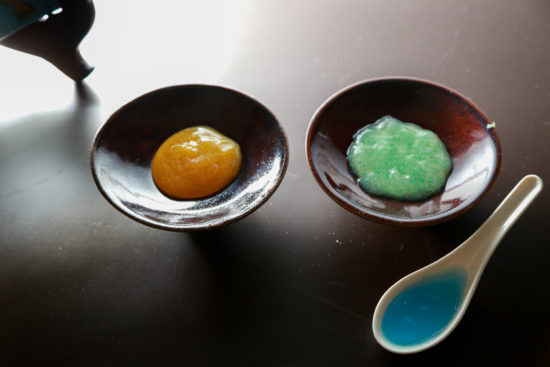While you stay at home, it can be easy to neglect keeping up with our appearance, but something not a lot of people see is that this is the ideal time to actually care more about it! Our daily lives can get busy, that is why as you stay home, why not pamper yourself? But before you go online and buy a mask or look in your fridge for natural ingredients to make one at home, you have to consider all of the different factors. Each person has a specific skin type, so choosing the right mask is essential since generally all of them usually have a mixture of common ingredients that fulfill the function to nourish, hydrate, moisten and soften the skin.
How to know my skin type?
The first thing you need to observe is how your skin reacts to the environment without lotion, makeup, or any other products. Wash your face, take a look in the mirror, and discover what your skin type is.
Dry Skin
It appears as tight, fragile, and rough. If you stain your face easily or it is constantly itchy, most likely, you have dry skin. This type of skin lacks the lipids necessary to retain moisture. When you have dry skin, dehydration usually appears in areas such as the cheeks and eyes.
Oily skin
What characterizes this type of skin is the shine in areas such as the forehead, chin, and large/visible pores, especially on the cheeks. Acne is also a sign of excess sebum.
Mixed skin
Mixed skins are oily and dry, with enlarged pores and some impurities such as black spots in the T zone (forehead, nose, and chin), while the cheeks are usually normal or dry.
Sensitive skin
If you usually notice redness, mild itching, tingling, or if your skin is easily irritated by any product, you may have sensitive skin. These skins can become dry or flaking; they can even develop pathologies of dry skin such as atopic dermatitis.
Mature skin
Over time, the dermis loses hydration to a great extent, due to the lack of collagen. So mature skin has some features of dry skin and usually affects those 40 years of age or older when facial skin loses elasticity, firmness, and becomes thinner.
What ingredients should I look for in my mask?

One of the many things about face masks is that not all ingredients are best suited for our skin, and not all work the same. Some masks are for hydrating, and others are used to cleanse excess oil and exfoliate the pores. Below we are going to give you a detailed recommendation based on the type of skin you have and what will work best for you!
Dry Skin
For those with dry skin, honey is an absolute lifesaver! Honey intensely nourishes while at the same time forming a barrier that retains moisture and protects the skin against external agents. Some other things you can use are milk and lactic acids, these nourish, soften, and moisturize the skin due to their high content of calcium and vitamins A, B, and D. One last trick is to also use broccoli and moringa oil, these also provide rich vitamins and nourish the skin amazingly.
Oily skin
Oily skin? Look for ingredients that absorb the fat and dirt from. For this, we rely on charcoal and salicylic; they absorb fat and dirt while also dragging dead cells from the pores. Clays, especially green clays, are other key ingredients in masks that are designed to treat dry skin.
Mixed skin
If your skin has both a dry and oily effect, choose any mask labeled “for all skin types.” Make sure that they contain Bifida ferment, this ingredient oxygenates the skin, removing dead cells, and above all, balances hydration, something that helps all areas of the face.
Sensitive skin
Sensitive skin is something that requires anti-inflammatory and antibacterial ingredients such as aloe vera, chamomile, and calendula, three very effective ingredients that also prevent irritation and redness. This type of skin requires a mixture of chia, argan, sesame, and avocado oil, perfect for pampering the skin.
Mature skin
For those with mature skin, it is necessary to add ingredients such as collagen, lavender, or snail slime. These key elements promote elasticity and firmness of the tissues, as well as their regeneration. Also, hyaluronic acid, vitamin C, silicon, or Asian orchid will help you achieve smooth skin.
Don’t want to buy any new masks? Well lucky for you, we have some easy and natural masks that you can do from the comfort of your own home so you can keep taking care of yourself during isolation!

Avocado mask
If you go to your fridge and find a ripe avocado, don’t throw it away, it is actually the perfect base for a face mask. All you have to do is extract all the pulp, add a teaspoon of olive oil, and mix it well. Apply the mixture to your face using a brush, don’t put any on your eyelids or eyebrows, and let it sit for 20 minutes. Once the time has passed, rinse it off with cold water. You can do this about once or twice a week.
Egg mask
It’s time to crack open this face mask and get a tablespoon of honey, a teaspoon of olive oil, and the yolk of an egg. Once you have all of the ingredients, mix them, and wash your face! After making sure your face is wet, apply to your face using a brush and let it sit for 15 minutes. Wash your face with warm water and after rinse it again with cold water so that you close any open pores.
Now there is no excuse for not being able to maintain a perfect complexion, don’t let staying at home stop you from taking care of yourself! From everyone at Sandos Hotels & Resorts and Spa del Mar, we hope to see you soon.
Your Amiga,
Martina
